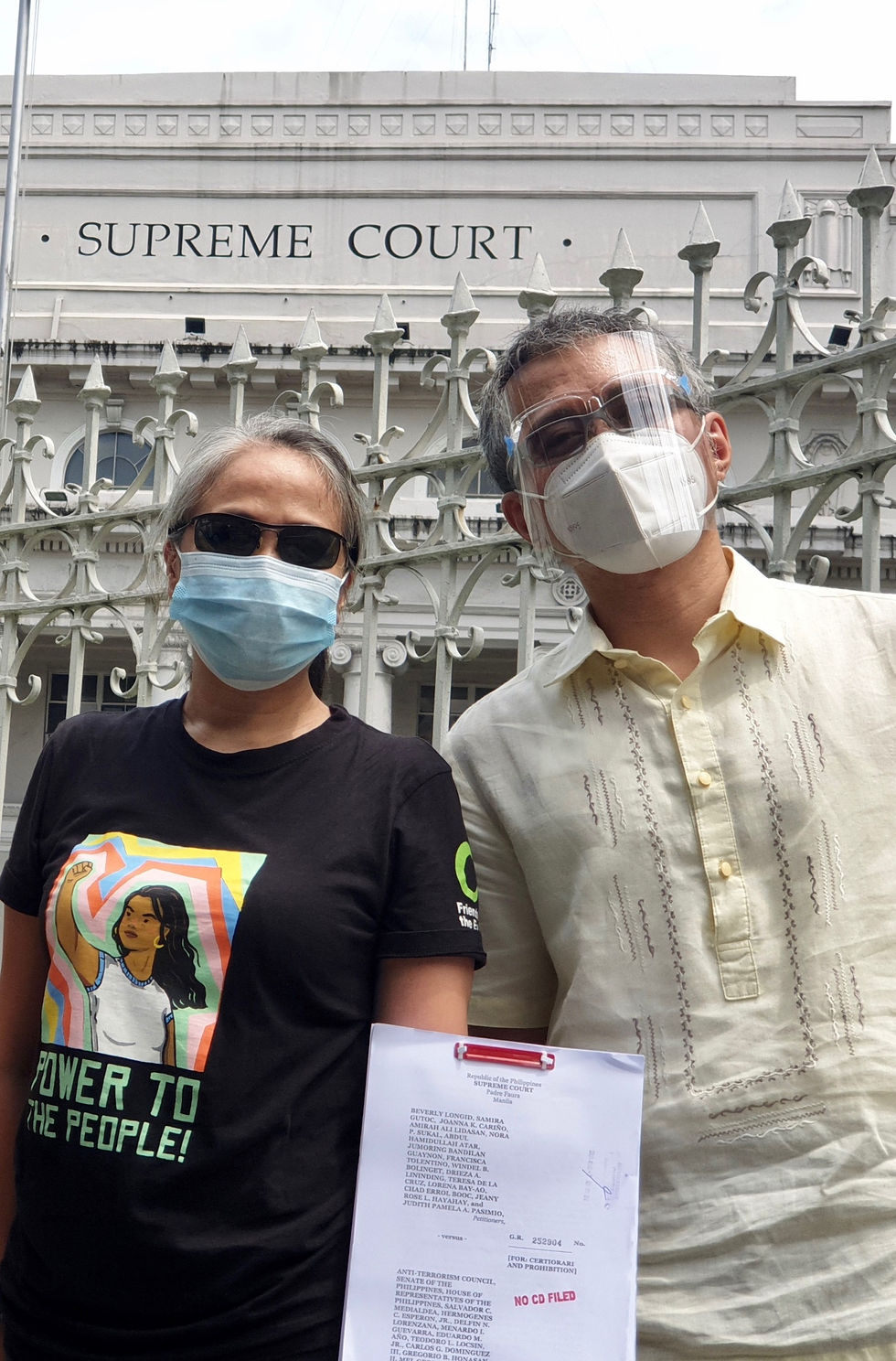LRC files petition on behalf of indigenous peoples against Anti-Terrorism Law
- Legal Rights Center
- Aug 8, 2020
- 3 min read

LRC files petition on behalf of indigenous peoples at the Supreme Court, in Manila, on 7 August 2020.
A group of indigenous and Moro leaders has filed the 26th petition against the government-backed Anti-Terrorism Law (ATL).
The petitioners, composed mostly of women, assailed the constitutional overreach of ATL. The petitioners, who are involved in the defense of indigenous rights and environmental rights, argued that the ATL is open to abuse and can be used a convenient cover to stifle legitimate dissent. The Legal Rights and Natural Resources Center filed the petition on their behalf at the Supreme Court on 7 August 2020.
The ATL was passed in July by Philippine Congress after the then bill was certified urgent by President Rodrigo Duterte, purportedly at the behest of an influential circle of military generals. The ATL repeals the Human Security Act of 2004, which authorities decried had been fundamentally useless in curbing terrorism with its provisions on detention and fines.
“As environmental and land rights defenders, the petitioners are right in the path of harm from the Anti-Terrorism Law. Indigenous peoples who resist large-scale development projects are often red-tagged, which legitimizes intimidation and harassment against them. It is also no accident that the petitioners are mostly women. They know too well that gender-based violence is embedded in a culture of impunity. For these reasons and more, the Legal Rights and Natural Resources Center need to be in the service as counsels to these extraordinarily brave petitioners,” said Atty. E.M. Taqueban of LRC.
Last week, international watchdog Global Witness released a report that found the Philippines was the deadliest place for environmental defenders in Asia in 2019[i], many of whom are indigenous peoples. It was the country’s second year in a row to top the list.
“I am fearful that the Anti-Terrorism Law will be used to silence indigenous leaders like me who oppose large-scale extractive projects that threaten to destroy water sources and small farmers’ livelihoods,” said Nora Sukal, a Blaan indigenous leader who signed the petition together with fourteen others. Nora’s community opposes the Tampakan Gold-Copper Project (TGCP) in South Cotabato. TGCP, which covers an area the size of the capital city Manila, is the largest open-pit mine project in Asia.
The Office of the President has recently restored the environmental compliance certificate (ECC) of TGCP.[ii] The ECC for TGCP had been cancelled by then environment secretary Gina Lopez. Meanwhile, the DENR has issued a statement that mining will be pursued as an economic recovery strategy from the COVID-19 pandemic.[iii]

LRC lawyers E.M. Taqueban and Ryan Roset.
“The Anti-Terrorism Law is in keeping with the theme of repression and vigilantism that has characterized this administration from the moment it assumed office. There are no two ways about it, the law is nothing but simple McCarthyism. This law concentrates power in the state, to allow it punish those who will not toe the government line. The law also effectively promotes self-censure. Ordinary citizens will cease from participating in a democracy by clipping their opinions on public policy and government performance,” said Atty. Ryan Roset, LRC’s direct legal services coordinator.
In a recent survey by the Social Weather Stations, 51% of respondents agree with the survey statement that “It is dangerous to print or broadcast anything critical of the administration, even if it is the truth.”[iv]
Aside from LRC, Atty. Tony Laviña and Atty. Joy Reyes are also co-counsels for the group.
LRC is a non-governmental organization that supports indigenous peoples’ access to justice and crafts research on and advocates for the indigenous peoples’ rights and environmental conservation nexus. It is the Philippines chapter of Friends of the Earth International.
Notes
[i] See the report of Global Witness here: https://www.globalwitness.org/en/press-releases/global-witness-records-the-highest-number-of-land-and-environmental-activists-murdered-in-one-yearwith-the-link-to-accelerating-climate-change-of-increasing-concern/ [ii] See report on the restoration of TGCP’s ECC here: https://mb.com.ph/2020/07/13/op-restores-ecc-for-5-9-b-tampakan-project/ [iii] See statement of the DENR on mining as an economic recovery strategy here: https://www.gmanetwork.com/news/news/nation/742025/denr-eyes-mining-river-dredging-to-spur-economic-recovery-amid-covid-19/story/ [iv] See the press release from the SWS on the survey results here: https://www.sws.org.ph/swsmain/artcldisppage/?artcsyscode=ART-20200807142142




Comments